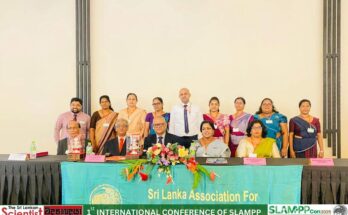Sri Lankas’ Finance Minister Mr. Ravi Karunanayaka presented the budget proposals for the fiscal year 2017 to the parliament on 9th of November. This budget can be described as a budget that has something positive for the development of Science, Technology and Innovation. In this article we aim to point out proposals that are directly related to the Science, Technology and Innovation (STI) development of Sri Lanka. This year the total allocation for the STI has been increased up to Rs. 1,306 million, this is a significant increase with compared to the Rs. 826 million allocation last year.
During the budget speech Mr. Ravi Karunanayaka emphasized important that we adequately financing and supporting the Science, Technology and Innovation (STI) space, as it is a vital component in realizing own development and policy goals including being self-sufficient in food crops/ food security, ensuring a healthy population, tapping into the global value chain, attaining the sustainable development goals, and creating a better public delivery system.
He also noted that this government is willing to partner the risks associated with Research and Development and are committed in creating an enabling environment for STIs to thrive in the country.

Given below are the main proposals put forward be the Minister of Finance that are directly related to STI development of Sri Lanka.
- 10 storied building will be constructed at the Ruhuna University Medical Faculty at Karapitiya enabling the intake to the Ruhuna Medical faculty to increase from 160 to 300 students. Allocation – Rs. 500 million
- Scholarship scheme to enable the undergraduate students of the 17 state universities who are the top 3 in the faculties of Engineering, Medicine, Bio and Physical Science, Accountancy, Finance and Law to be given scholarships at top universities around the world such as Harvard, MIT, Oxford, Cambridge, NUS etc, to follow post graduate studies up to PhD level. Allocation – Rs. 500 million.
- Monetary allocations to the National Science Foundation (NSF) to facilitate research mainly in CKDu and other key NCDs in the country. Rs. 100 million
- Continuation of the Innovation Accelerator Fund, aimed at supporting commercialization and particularly last stage financing that is necessary. Allocation – Rs. 100 million
- Establishment of a Biotechnology Innovation Park which will provide facilities mainly for companies engaged in the Pharmaceutical Industry, Genomics etc. This will be spearheaded by the Coordinating Secretariat for Science, Technology and Innovation (COSTI) to on a PPP basis. The government will allocate land and utilities such as electricity and water. Allocation Rs.100 million.
- Monetary allocation to the Center for Advanced Electronic Design at the University of Moratuwa which supports startup companies in niche areas in electronics. Rs. 100 million
- Monetary allocation to the Sri Lanka Institute of Nanotechnology (SLINTEC). Rs. 100 million
- Further strengthen the establishment work of the Centre of Excellence in Robotics Applications (CERA). Allocation – Rs. 50million to this Centre.
- Monetary allocation to the Sri Lanka Institute of Nanotechnology (SLINTEC). Rs. 50 million
- Monetary allocation to expand the Pharmaceutical Labs at the Industrial Technology Institute (ITI) – Rs. 150 million
- The Ministry of Finance, Department of Customs and Telecommunications Regulatory Commission (TRC) in collaboration with the relevant stakeholders will implement a new scheme in addressing import and export issues at the Customs on biological consumables, samples and equipment. And the Customs duties applicable on materials to create prototypes will also be removed.
- Tax incentives to support upcoming industries in Robotics, cybernetics, electronics etc.
- A transparent tier based research performance scheme tagged to the Hirsch Index (H Index) will be introduced by the UGC to motivate academic staff members of the universities towards impactful research performance and to improve their retention within the university system.
- Establish a fund with an initial capital of Rs. 5 billion which will provide loans together with guarantees, to support entrepreneurs that will engage in Product Design Engineering (PDE). Allocation – Rs. 500 million
- Establish incubators in 5 districts in collaboration with the Nenasala‟s which will then be expanded to all 25 districts by 2020 on PPP basis to support startups. Allocation – Rs. 100 million
The committee Stage debate on the ministry of Science, Technology and Research was held today (23rd November) and minister Susil Premajayantha speaking during the debate stated that 70% of the allocations from the year 2016 has been spent already. Speaking further Minister Susil Premajayantha explained “Sri Lanka spend only 0.16% of the GDP on Research and Development of the country which is a very low amount compared to some of the developed and developing countries. As a government we have already taken steps to gradually increase this amount to a much higher level.”
Minister also emphasized some of the positive outcomes of the STS forum held on this September that includes improved relationships with major universities around the world, and more study tour options for Sri Lankan teachers, Doctors and Students in countries like Japan and Switzerland.
He pointed out that the Science park which has been planned to establish in Pitipana will be a major milestone in Sri Lankan STI history. Ending his speech Minister Susil Premajayantha emphasized the importance of Science education in the development of the country as we can no longer rely on traditional export based economy.



 SAHASAK NIMAVUM 2025: Sri Lanka’s Premier Innovation Showcase Returns This April!
SAHASAK NIMAVUM 2025: Sri Lanka’s Premier Innovation Showcase Returns This April! 
